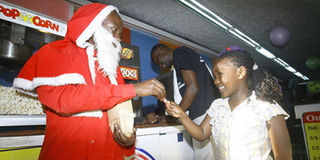Most prefer cash to gifts

Mr Tom Nyakeroro (Left) acting as a father Christmas giving goodies to a girl Lavinia Biketi on 24th December 2012 at the chicken house Kimathi street. Photo/DANIEL IRUNGU.
There is going to be a bit of disappointment around the Christmas dinner table this year.
Many of you would have preferred money for a Christmas gift but few will get it, according to a new survey by Consumer Insight.
Kenyans would rather be given money than clothing or a phone, the research shows, but those polled also said they would rather buy a gift than give money. If it makes anyone feel better, M-Pesa transactions peaked this week of Christmas, meaning that a lot of people got their wish.
“Generally, we noticed an upward spike in transactions starting from December 20. We have noticed that there is usually a 20 to 40 per cent increase during this time from our current average of 2.5 million transactions daily,” said Safaricom corporate affairs director Nzioka Waita.
A mobile phone is ranked the second most preferred gift with a car or motorcycle listed third on the wish-list.
If you are thinking of giving people food as a gift, think again. Food and a television set are the least desired gifts, according to the study.
And with children going back to school a few days into the New Year, some Kenyans said they would appreciate a gift in the form of school fees.
Other desired gifts include clothes and shoes, a laptop or gift vouchers.
The most popular activity on Christmas Day is going to church, with four out of 10 Kenyans polled saying they will attend a service. Still, three out of 10 respondents said they would just relax at home.
Other favourite activities during this festive week include organising or attending family get-togethers, travel upcountry and a visit to public parks, restaurants or bars. Sixty-four per cent of Kenyans believe that they will spend more this Christmas because the cost of living has risen.
However, according to the poll, fewer Kenyans plan to travel to their rural homes compared to previous years, citing a rise in travel cost.
And for those travelling within the country, four out of five will be accommodated by friends or relatives in their homes, meaning only about one in 10 of those travelling will stay in a hotel.
The poll commissioned by the Nation was conducted in the week before Christmas through Computer Aided Telephonic Interviews to discover Christmas attitudes and behaviour among Kenyans.
Another poll by Ipsos-Synovate carried out last week largely corroborates these trends and found that 82 per cent of respondents will go to church on Christmas, 81 per cent will buy a Christmas card or send an SMS with an Xmas message, while 67 per cent will buy gifts for parents. Only 39 per cent gave travelling as the favourite activity in the festive season.
Spending on food will take at least half of the shopping expenses compared to others like clothes and entertainment at 16 and 13 per cent respectively.
Inflation has declined dramatically from 19.72 per cent in November last year to 3.25 per cent last November. Few Kenyans, however, are expected to spend on cash handouts.
The real eye-opener, however, is the most popular travel destination: the upcountry home, followed by Mombasa and Nairobi.




